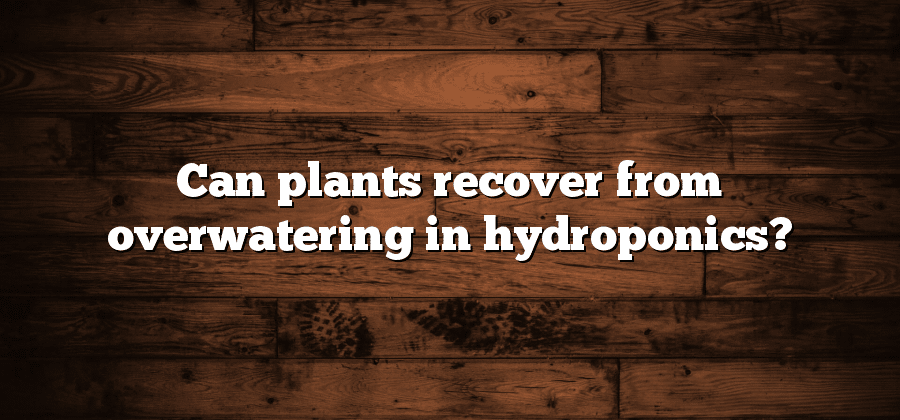Signs of Overwatering in Hydroponic Plants
One of the signs of overwatering in hydroponic plants is wilted and yellowing leaves. When plants receive too much water, their roots become saturated, leading to oxygen deprivation. This lack of oxygen affects the plant’s ability to absorb nutrients and causes the leaves to turn yellow and droop. Additionally, overwatered plants often have soft and mushy roots. The excessive moisture can lead to root rot, making the roots weak and unable to support the plant properly.
Another sign of overwatering in hydroponic plants is stunted growth. When plants are overwatered, their roots struggle to absorb nutrients effectively. This nutrient deficiency can inhibit the plant’s growth and development, causing it to remain small and undersized. Additionally, overwatering can lead to poor oxygen circulation in the root zone, further impeding the plant’s ability to uptake essential nutrients and grow to its full potential.
Recognizing the signs of overwatering in hydroponic plants is crucial in maintaining their health and preventing potential damage. By being mindful of these indicators, growers can adjust their watering practices accordingly and create optimal growing conditions for their plants.
The Effects of Overwatering on Plant Health
Overwatering is a common issue that can have detrimental effects on the health of hydroponic plants. When plants receive an excess amount of water, their root systems become overly saturated, leading to a lack of oxygen. Without adequate oxygen, the roots are unable to perform necessary functions, such as nutrient absorption and respiration. As a result, the overall health of the plants is compromised.
One of the immediate effects of overwatering is the development of root rot. Excess moisture creates the perfect conditions for fungal and bacterial growth, which can quickly attack and decay the roots. As the roots weaken and deteriorate, the plants become more susceptible to diseases and infections. Additionally, overwatered plants often display wilting leaves, yellowing or browning of foliage, and stunted growth. These visible signs indicate that the plant’s physiological processes have been disrupted, hindering its ability to thrive and produce healthy yields.
Factors Contributing to Overwatering in Hydroponics
Overwatering is a common issue in hydroponics, which can have negative effects on plant health and overall productivity. Several factors contribute to overwatering in hydroponic systems, making it important for growers to identify and address these issues to ensure optimal plant growth.
One factor that leads to overwatering is improper timing and frequency of irrigation. When growers fail to establish a proper irrigation schedule, plants may be consistently exposed to excessive moisture, hindering their ability to absorb oxygen from the root zone. This can result in root rot and other diseases, ultimately compromising plant health and productivity.
Another factor contributing to overwatering is the incorrect adjustment of irrigation systems. If the flow rate or duration of irrigation cycles is set too high, it can lead to excess moisture in the growing medium. Additionally, poorly designed irrigation systems that do not evenly distribute water throughout the entire system can cause certain areas to be oversaturated, promoting overwatering in those specific areas.
Lack of proper drainage is yet another factor that may contribute to overwatering. In hydroponic systems, excess water needs to be drained effectively to prevent waterlogged conditions. Without adequate drainage, water can accumulate in the system, resulting in a lack of oxygen to the roots and increased vulnerability to diseases.
These factors highlight the importance of proper planning and monitoring in hydroponics to prevent overwatering. By understanding and addressing the factors contributing to overwatering, growers can ensure healthier plants and maximize the productivity of their hydroponic systems.
How Overwatering Affects Nutrient Uptake in Plants
Overwatering can have detrimental effects on the nutrient uptake of plants in hydroponic systems. When plants are constantly submerged in water, the excess moisture can lead to oxygen deprivation at the root level. This lack of oxygen hinders the plants’ ability to take in nutrients from the solution, as the roots become less active in nutrient absorption. Additionally, overwatering can create a stagnant environment, which promotes the growth of pathogens that can cause root rot and other diseases. These pathogens can further impede the plants’ ability to absorb nutrients, resulting in stunted growth and poor overall health.
Strategies to Prevent Overwatering in Hydroponic Systems
One effective strategy to prevent overwatering in hydroponic systems is to implement a well-designed watering schedule. This involves determining the specific water requirements of each plant variety and adjusting the frequency and duration of watering accordingly. It is essential to monitor the moisture levels of the growing medium regularly and adjust the watering schedule as needed. By adopting a systematic approach to watering, growers can ensure that the plants receive the right amount of water without drowning the roots.
Another strategy to prevent overwatering is to improve the drainage system within the hydroponic system. Proper drainage is crucial to allow excess water to drain away from the roots and prevent waterlogged conditions. This can be achieved by using well-draining growing media and incorporating drainage mechanisms such as drainage holes or channels in the grow trays. Additionally, ensuring that the hydroponic system is properly leveled can help prevent water accumulation in certain areas. By maintaining good drainage, growers can effectively prevent overwatering and maintain optimal conditions for plant growth in hydroponic systems.






